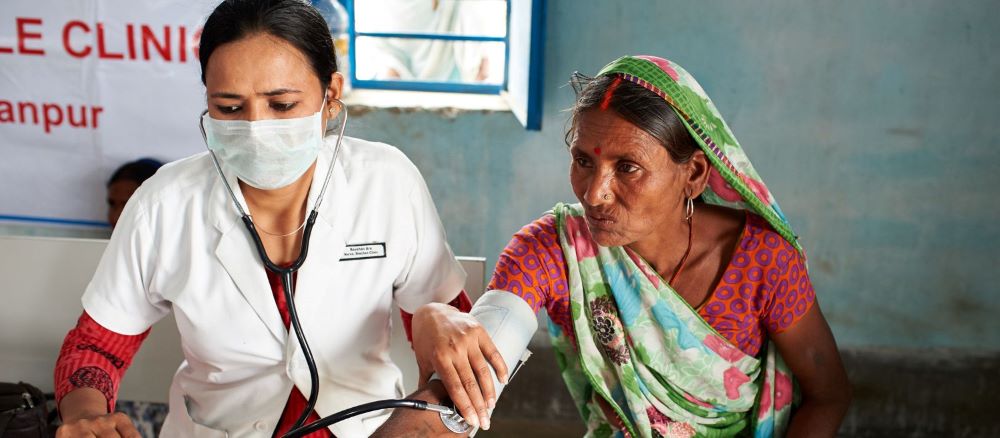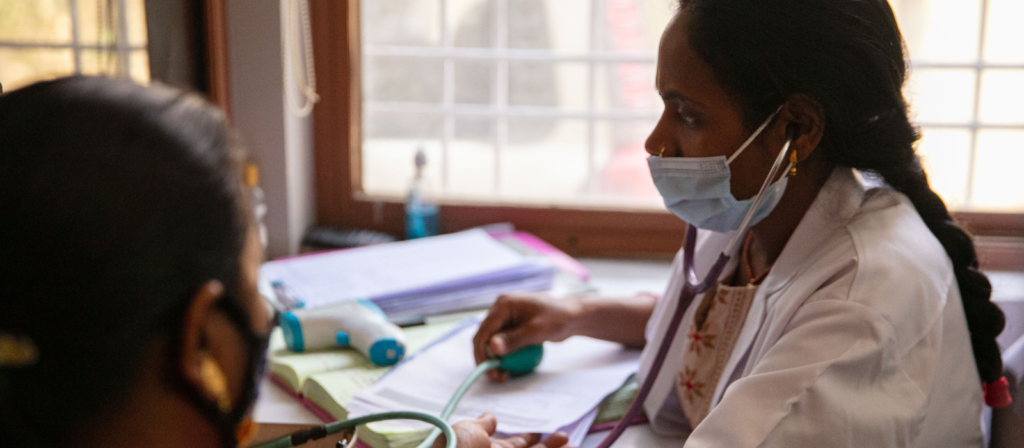Medical staff and social workers often find themselves in highly stressful and emotionally burdensome situations working long hours while dealing with difficult cases. So that they feel appreciated and supported, a show of gratitude – in thought, word and...

Medical staff and social workers often find themselves in highly stressful and emotionally burdensome situations working long hours while dealing with difficult cases. So that they feel appreciated and supported, a show of gratitude – in thought, word and deed – is needed in order to nourish their motivation and give them courage while strengthening the bond with patients and with the civic community.
For this gratitude to have meaning beyond words, it is important first to give them the means to carry out their mission of alleviating the suffering of others and to improve their working conditions so that they can keep on going without falling prey to exhaustion and burnout.
Caregivers are confronted with the suffering of others on a day-to-day basis, and often feel empathy for their patients, thereby suffering themselves.. This empathy-driven suffering is real and neuroscience studies have shown activation in the brain areas linked to pain or distress. As patients come and go, the caregiver’s load of empathic suffering is renewed day after day. In many cases, the caregiver will end up experiencing burnout. Their capacity to resist the suffering of others is exhausted; they can no longer stand the situation. And those who suffer from this type of burnout are often led to interrupt their activity. Emotional exhaustion is the feeling of being “drained”, “at the end of one’s rope”, of no longer having the energy or pleasure to face tomorrow. Those who find themselves in this situation limit their personal relationships with others.
This is sometimes referred to as compassion fatigue. The work of neuroscientist Tania Singer, with whom I have worked extensively, shows that it is more accurate to speak of empathy fatigue. Empathy is merely a state of affective resonance with the sufferer. Accumulated, it can easily lead to exhaustion and distress. But altruistic love, compassion, is a constructive state of mind that helps both the one who feels it and the one who receives it. Cultivating this kind of caring can therefore help remedy the difficulties posed by burnout.
To reduce burnout among healthcare professionals, and to avoid dehumanizing a profession whose very essence is humanity, it would be helpful to provide them with ways to develop the inner qualities and resilience they need to better care for patients and to experience greater satisfaction and emotional balance. Better yet, by focusing on compassion, those designing or reforming healthcare systems could be more inclined to place emphasis on how patients are treated rather than on reducing costs and speeding up care.
Burnout also manifests itself as a loss of a sense of personal accomplishment and self-actualization, leading to a feeling of failure. The loss of confidence in oneself and in the value of what one has accomplished leads to deep discouragement and, very often, to depressive states.
In January 2023, the Ethics Committee of the FHF (Fédération Hospitalière de France – the French hospital federation) published a report based on the nation-wide survey “Taking care of health professionals”. Addressed to hospital staff of public medical and social establishments, this large-scale study revealed that “a majority of the professionals surveyed (80%) are proud of their profession, which makes them feel useful (91%). But a large majority also consider that their work generates stress (89%). Nearly 50% of respondents said they would not recommend their profession, despite the sense of pride and usefulness they derive from it, [and] nearly three-quarters of respondents have “the impression of a major shift in the exercise of their profession“.
The health crisis has highlighted the interdependence that is essential to the proper functioning of our societies. Despite the lack of resources, thanks to their mobilization and resilience, medical professionals were able to ensure continuity of care amidst massive influx of patients,, sometimes to the detriment of their own health.
Between efficiency objectives (maximum public health with available resources) and equity concerns (access for all to the best possible care): What can we do to raise awareness and contribute to the well-being of those who take on the mission of care? How can we, at our own level, help caregivers prevent many disorders and suffering from emerging?
For recommendations to be effective, we must take heed of the alerts sounded by the personnel of healthcare institutions and act in consideration of their work experience. Keeping ourselves informed allows us to better understand the extent to which their situation is rendered invisible and the need to protect them.
The need to be listened to, encouraged and acknowledged, the need to improve the professional environment and the need to increase salaries are at the top of the list of criteria impacting the appeal of the medical sector.
A simple and effective action we can take at our level is to remember that the medical act finds its source in people who are constantly confronted with the suffering of others, bearing all the emotional charge this entails, and whose purpose is to relieve this suffering. Patients should strive to show active recognition, respect and trust towards medical professionals.
A most basic act of kindness would be to simply ask ourselves the question, do I really need to go to the emergency room? A large proportion of ER visits are avoidable. We can each contribute to making a difference by taking a few minutes to analyze the situation and determine whether it is necessary to go or if it can wait for a consultation with a general practitioner. This way, we can help make sure we do not unnecessarily contribute to overloading services that are already under pressure. Though of course, certain situations will still require emergency care.
Our existence, and even our survival, is closely dependent on our ability to build mutually beneficial relationships with others. Human beings have a deep need to feel connected, to trust and to be trusted by others, to love and be loved in return. Researchers have shown that feeling connected to others increases our psychological well-being and physical health, while decreasing the risk of depression. Feeling connected and part of a larger community also increases empathy and promotes trusting and cooperative behaviors. All of this creates a virtuous circle or, rather, in the words of Barbara Fredrickson, one of the founders of positive psychology, an upward “virtuous spiral”, whereby trust and willingness to cooperate are strengthened the more they are shared.
Having good social ties is therefore a fundamental and vital need. The health crisis and societal changes linked to individualism have led to widespread mistrust and increased prejudice. Cultivating calm interpersonal skills gives confidence and reinstates a human dimension to care.
Sources
Résultats de l’enquête ‘Prendre soin des professionels de la santé’ Actualité et dossier en santé publique n° 110: Prendre soin des professionnels de santé Klimecki, O., & Singer, T. (2011). Empathic distress fatigue rather than compassion fatigue? Integrating findings from empathy research in psychology and social neuroscience. Pathological Altruism, 368–383. Klimecki, O. M., Leiberg, S., Ricard, M., & Singer, T. (2014). Differential pattern of functional brain plasticity after compassion and empathy training. Social Cognitive and Affective Neuroscience, 9(6), 873–879.












